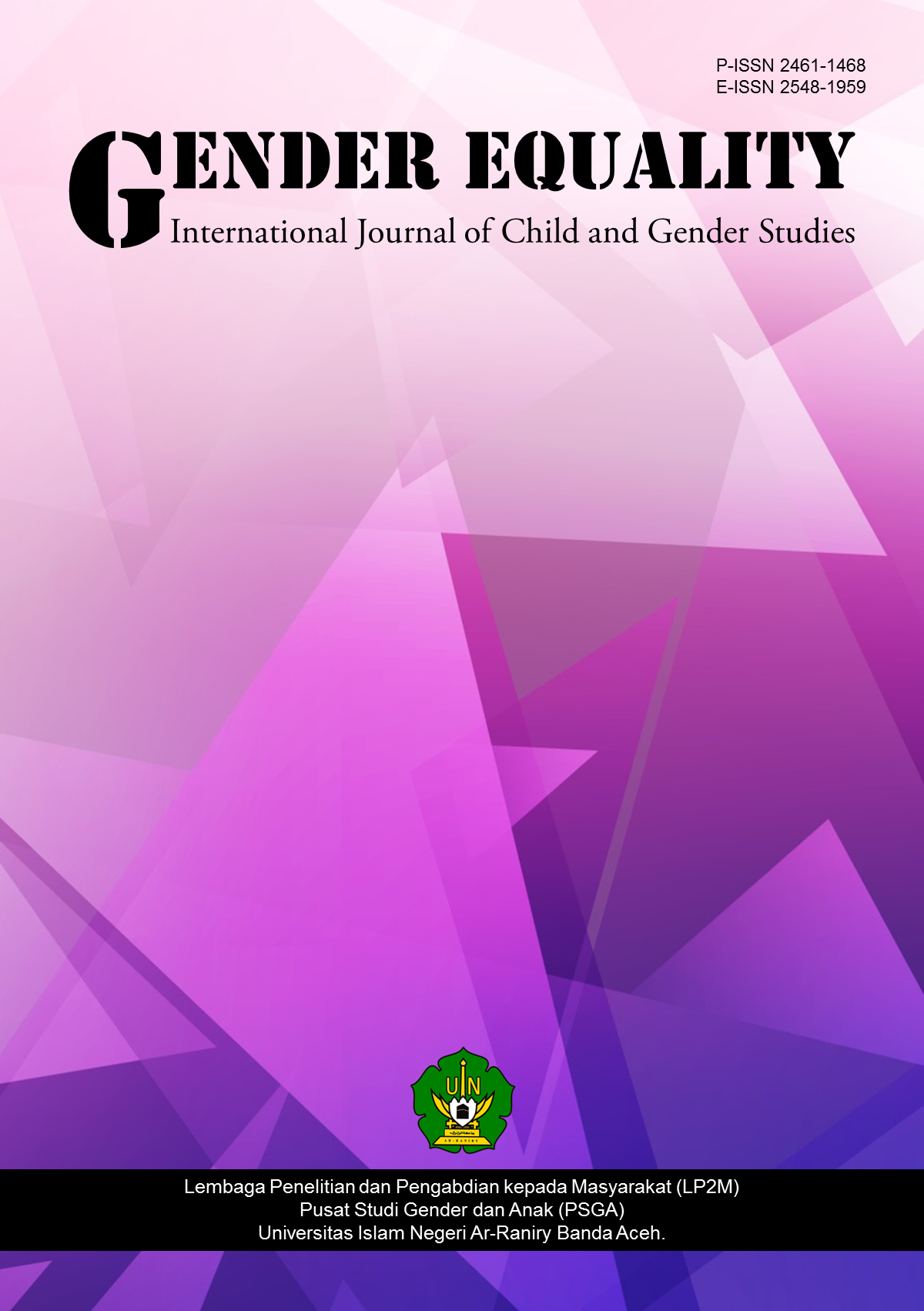The value of feminism and the role of women in the 4.0 revolution era: Studying the book of Al-Mar'ah Al-Sholihah
DOI:
https://doi.org/10.22373/equality.v7i2.10888Keywords:
al-Mar’at al-Sholeha, feminisme, revolusi 4.0Abstract
The discourse of feminism in the perspective of the pesantren kiai invites attention to be studied. Feminism is a movement that arises due to the arbitrary treatment of women who further demands equal rights and proper behavior between men and women. It’s just that, in its practice, there is a conventional way of thinking, and civilized has placed women not worth and even under men. This kind of culture has given birth to many problems and suffering in women because women are discriminated against, even receiving a lot of unfair treatment. Therefore, the feminist movement is trying to fight for women to get an equal and fair position in this era. This paper discusses the equality of rights between women and men in the book al-Mar’a al-Sholihah by Kiai Masruhan Maghfuri, who comes from pesantren. He is a scholar of Nusantara who discusses the praiseworthy morals for the generation of Muslim women. This research is classified as library research using a qualitative approach. The study results show that the study of feminism in the book and its relevance in its role in the era of revolution 4.0. Women have the right to get a balanced job and education with men to be good women for their country and change the economic sector by becoming a career women after carrying out their obligations to take care of the household. Women are given space to actualize themselves in the community without forgetting their nature.
References
Al-Maghfuri, M. (1970). al- Mar’ah al-sholihah. Surabaya: Kitab Al Hikmah.
Andik Wahyun Muqoyyidin. (2013). Wacana kesetaraan gender : Pemikiran Islam kontemporer tentang gerakan geminisme Islam. Al-Ulum, 13(2), 491–512.
Azra, A. (2019). Pendidikan Islam: Tradisi dan modernisasi di tengah tantangan milenium III. Jakarta: Prenada Media.
Bruinessen, M. Van. (2015). Kitab kuning, pesantren dan tarekat (cetakan II). Yogyakarta: Gading Publising.
Danandjaja, J. (1997). Folklor Indonesia: Ilmu gosip, dongeng, dan lain-lain. Jakarta: PT. Pustaka Utama Grafiti,.
Dhofier, Z. (1982). Tradisi pesantren: Studi tentang pandangan hidup kyai. Jakarta: LP3ES.
Djoharwinarlien, S. (2012). Dilema kesetaraan Gender: Refleksi dan respons praksis. Yogyakarta: Center for Politics and Government (PolGov) Fisipol UGM.
Efendi, E. (2019). Gender prspektif gender etika pesantren. An-Nisa’, 11(2), 255-270
Fealy, G., & Hooker, V. M. (2006). Voices of Islam in Southeast Asia: A contemporary sourcebook. Singapore: Institute of Southeast Asian Studies.
Hanapi, A., & Wahyuni, Y. S. (2021). Pandangan masyarakat terhadap nusyuz dan implikasinya terhadap relasi suami-istri. Gender Equality: International Journal of Child and Gender Studies, 7(1), 125–134.
Hanim, H. (2020). Hanim, H. (2020). Peranan Wanita Dalam Islam Dan Feminisme Barat. AT-TARBAWI: Jurnal Pendidikan, Sosial, Dan Kebudayaan, 12, 140–150. AT-TARBAWI: Jurnal Pendidikan, Sosial, Dan Kebudayaan, 12, 140–150.
Hermawati, W. (2020). Kesetaraan gender dalam pelaku IPTEK. Jakarta: LIPI Press.
Junaidi, H., & Hadi, A. (2014). Gender dan feminisme dalam Islam. MUWAZAH: Jurnal Kajian Gender, 2(2), 245-256
Marhumah, E. (2011). Konstruksi sosial gender di pesantren; Studi kuasa kiai atas wacana perempuan. Yogyakarta: Lkis Pelangi Aksara.
Marlinda, pratama dan. (1967). Konsep akhlak dalam Kitab Mar’atus Sholihah. Angewandte Chemie International Edition, 6(11), 951–952., 5–48.
Masfiah, U. (2010). Respons santri terhadap kitab Risalah al-Mahîd sebagai pedoman haid santri di pesantren Manbail Futuh, Jenu, Tuban, Jawa Timur. Jurnal Analisa, 17(02), 243–262.
Muhammad, H. (2019). Fiqih wanita. Yogyakarta: Ircisod.
Mulyani, E. (2017). Kesetaraan gender dalam tulisan R.A Kartini perspektif Pendidikan Islam. Skripsi IAIN Purwokerto, 1–111.
Munadiroh, S. (2018). Konsep pendidikan akhlak istri terhadap suami dalam kitab al-Mar’ah ash-Sholihah karya KH. Masruhan al-Maghfuri. Skripsi IAIN Salatiga.
Mutmainnah, M. (2019). Kesenjangan gender ditinjau dari Perspektif Islam. Gender Equality: International Journal of Child and Gender Studies, 5(1), 1-8. https://doi.org/10.22373/equality.v5i1.5374
Nuroniyah, W. (2013). Feminisme dalam pesantren: Narasi pemberdayaan perempuan di Pondok Pesantren Buntet Cirebon. Holistik, 14(1), 151-173.
Qibtiyah, A. (2020). Arah gerakan feminis muslim di Indonesia. In Pidato Pengukuhan Profesor. Yogyakarta: UIN Sunan Kalijaga. Retrieved from http://digilib.uin-suka.ac.id/40972/
Rowley, J., & Slack, F. (2004). Conducting a literature review. Management Research News, 27(6).
Towaf, S. M. (2008). Peran perempuan, wawasan gender dan implikasinya terhadap pendidikan di pesantren. Jurnal Ilmu Pendidikan Universitas Negeri Malang, 15(3), 101774.
Ulum, M. B. (2017). KH. M. Bisri Syansuri dan pembaruan pesantren. Falasifa, 8(2), 195–212.
Umar, N. (2017). Argumen kesetaraan gender prespektif Al-Qur’an. Jakarta: Paramadina.
Utami, S. (2019). Eksistensi perkembangan perekonomian perempuan di era digitalisasi. AN-NISA, 12(1), 596-609. https://doi.org/10.30863/annisa.v12i1.454
Utaminingsih, A. (2017). Gender dan wanita karir. Bandung: UB Press.
Zulyadain. (2017). Persepsi gender dan relasi sosial di masyarakat. Tasamuh: Jurnal Studi Islam, 9(1), 267–290.
Downloads
Published
Issue
Section
License
GENDER EQUALITY: International Journal of Child and Gender Studies allows the author(s) to hold the copyright and to retain the publishing rights without restrictions. Authors who publish with this journal agree to the following terms:
- Authors retain copyright and grant the journal right of first publication with the work simultaneously licensed under a Creative Commons Attribution License that allows others to share the work with an acknowledgment of the work's authorship and initial publication in this journal.
- Authors are able to enter into separate, additional contractual arrangements for the non-exclusive distribution of the journal's published version of the work (e.g., post it to an institutional repository or publish it in a book), with an acknowledgment of its initial publication in this journal.
- Authors are permitted and encouraged to post their work online (e.g., in institutional repositories or on their website) prior to and during the submission process, as it can lead to productive exchanges, as well as earlier and greater citation of published work.



